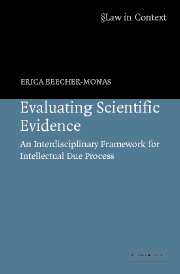Book contents
- Frontmatter
- Contents
- Acknowledgments
- Evaluating Scientific Evidence
- Introduction
- 1 Triers of science
- 2 What is intellectual due process?
- 3 A framework of analysis
- 4 Toxic torts and the causation conundrum
- 5 Criminal identification evidence
- 6 Future dangerousness testimony: The epistemology of prediction
- 7 Barefoot or Daubert? A cognitive perspective on vetting future dangerousness testimony
- 8 Future dangerousness and sexual offenders
- 9 Models of rationality: Evaluating social psychology
- 10 Evaluating battered woman syndrome
- Conclusion
- Index
- The Law in Context Series
Introduction
Published online by Cambridge University Press: 04 December 2009
- Frontmatter
- Contents
- Acknowledgments
- Evaluating Scientific Evidence
- Introduction
- 1 Triers of science
- 2 What is intellectual due process?
- 3 A framework of analysis
- 4 Toxic torts and the causation conundrum
- 5 Criminal identification evidence
- 6 Future dangerousness testimony: The epistemology of prediction
- 7 Barefoot or Daubert? A cognitive perspective on vetting future dangerousness testimony
- 8 Future dangerousness and sexual offenders
- 9 Models of rationality: Evaluating social psychology
- 10 Evaluating battered woman syndrome
- Conclusion
- Index
- The Law in Context Series
Summary
Scientific evidence pervades modern legal decisions, whether the decision is made in the courtroom, during the regulatory process, or through legislation. The question of what counts as scientific knowledge has become a focus of heated courtroom and scholarly debate, not only in the United States but also in other common-law countries such as the United Kingdom, Canada, and Australia. Controversies are rife about what is permissible use of genetic information, if chemical exposure causes disease, and whether future dangerousness of violent or sexual offenders can be predicted, among other important topics. Many time-honored methods of criminal identification, such as hair analysis, voice spectography, and bitemark identification, to name a few, have turned out to have no better foundation than ancient divination rituals. This book examines the process of evaluating scientific evidence in both civil and criminal contexts and explains how decisions by nonscientists that embody scientific knowledge can be improved. This is a timely and important subject for anyone interested in the impact of law and science on society.
Evaluating Scientific Evidence: An Interdisciplinary Framework for Intellectual Due Process emphasizes the unifying themes of probabilistic reasoning, hypothesis testing, and interdisciplinarity, and it is intended to provide the guidance that judges and the lawyers advising them need to make scientifically legitimate admissibility determinations. Moreover, scholars who turn to interdisciplinary arguments are confronted with an urgent need for a framework to evaluate scientific argument.
Evaluating Scientific Evidence is intended to provide this guidance to scholars, judges, lawyers, and students of law.
- Type
- Chapter
- Information
- Evaluating Scientific EvidenceAn Interdisciplinary Framework for Intellectual Due Process, pp. 1 - 3Publisher: Cambridge University PressPrint publication year: 2006



